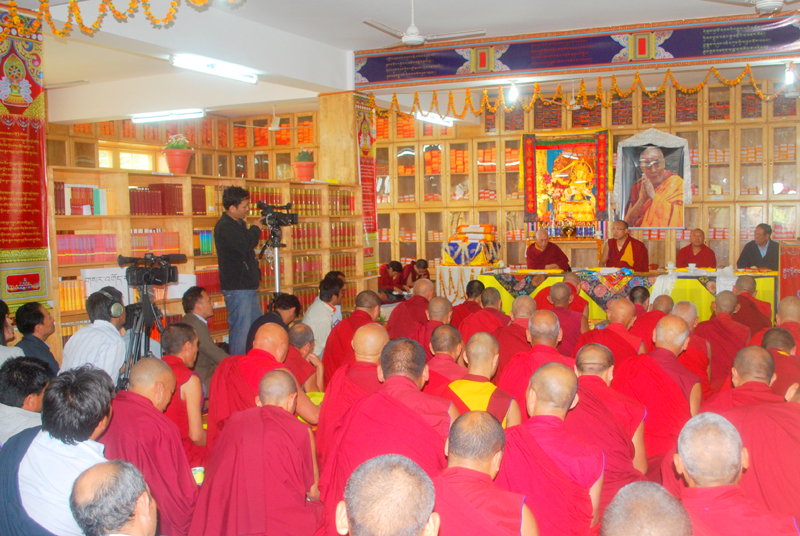 Dharamshala: - On April 18, His Holiness the Karmapa Ogyen Trinley Dorje opened a new library at Gyuto Monastery, near the Norbulingka cultural institute in Dharamsala, northern India. He also presented Geshe Nagrampa degree certificates to four of the monastery's monks.
Dharamshala: - On April 18, His Holiness the Karmapa Ogyen Trinley Dorje opened a new library at Gyuto Monastery, near the Norbulingka cultural institute in Dharamsala, northern India. He also presented Geshe Nagrampa degree certificates to four of the monastery's monks.
The ceremony was also attended by the former Kalon Tripa (political leader) of the Tibetan Central Administration, Samdhong Rinpoche, Pema Choejor, minister for religious affair s, and Tulku Tenzin Jampa Choesang Rinpoche, abbott of Gyuto Monastery.
Samdhong Rinpoche said that library and information science is becoming a popular subject of study in the West, but that there it has only a four-hundred-year history, whereas the subject originated in Tibet.
He continued that India's ancient Nalanda University was nine storeys high but that there is no record of whether library science was practiced there.
He added that, in Tibet, library science developed during the process of categorizing Buddhist texts, including Kangyur and Tengyur, as they were translated from other languages into Tibetan.
His Holiness the Karmapa said that many Tibetans have an image of Tibetan libraries being full of shelves of rarely studied dusty old books with prayer offerings laid out in front of them.
He continued that, during his recent teachings in Bodhgaya, His Holiness the Dalai Lama said his followers always request him to give Buddhist teachings, but don't take the initiative to study the Buddha's teachings much themselves. The Karmapa said he often feels the same.
Pema Choejor told the audience that, when China occupied Tibet, around 90% of Tibetan religious and cultural artefacts were damaged or destroyed, but that most were later repaired.
He continued that there are now around 700 Buddhist centres worldwide, some of which are located in places where previously people had never heard of Tibet.
Mr Choejor said there are many refugees in the world but that Tibetan refugees are different because they have His Holiness the Dalai Lama and are able to restore and develop their religious culture.
He joked that Mao Tse Tung used to tell His Holiness that religion is poison but that, if he were alive today, he would see the error of his ways.
Mr Choejor concluded that, although Tibetan religion and culture are in a process of repair and development, their future is still a major question.


![Tibet has a rich history as a sovereign nation until the 1950s when it was invaded by China. [Photo: File]](/images/stories/Pics-2024/March/Tibet-Nation-1940s.jpg#joomlaImage://local-images/stories/Pics-2024/March/Tibet-Nation-1940s.jpg?width=1489&height=878)















